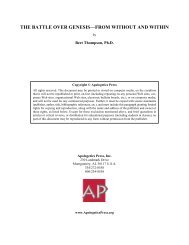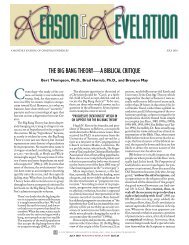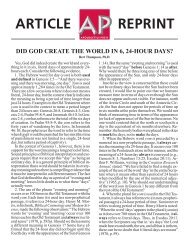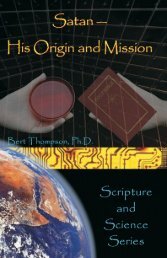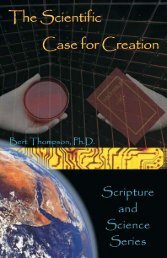The Many Faces, and Causes, of Unbelief - Apologetics Press
The Many Faces, and Causes, of Unbelief - Apologetics Press
The Many Faces, and Causes, of Unbelief - Apologetics Press
Create successful ePaper yourself
Turn your PDF publications into a flip-book with our unique Google optimized e-Paper software.
[G]ranting that there are no real finite selves or “I’s,”<br />
then there is no such thing as an I-Thou relationship<br />
between finite selves nor between man <strong>and</strong> God. Both<br />
fellowship <strong>and</strong> worship become impossible. All alleged<br />
I-Thou or I-I relations reduce to I.... Religious<br />
experience is impossible in any meaningful sense <strong>of</strong><br />
the term since all meaningful experience involves<br />
something or someone other than oneself with whom<br />
one enters the changing experience (1976, pp. 187<br />
189).<br />
How, we must ask, is it possible to communicate (physically<br />
or spiritually) with an impersonal, unconscious “It”?<br />
Fourth, pantheists believe that God is the one absolute, unchanging<br />
reality. Yet they also believe it is possible for humans<br />
to come to realize that they are God. But if humans come<br />
to realize something, then they have changed along the way.<br />
A process has occurred that brought them from a point where<br />
they did not know they were God to a point where they now<br />
know they are God. That is to say, a “change” has occurred.<br />
As Geisler <strong>and</strong> Brooks put it: “But God cannot change. <strong>The</strong>refore,<br />
anyone who ‘comes to realize that he is God’ isn’t! <strong>The</strong><br />
unchanging God always knew that He is God” (1990, p. 46).<br />
<strong>The</strong> pantheist cannot have it both ways.<br />
Fifth, the concept <strong>of</strong> self-deification inherent in pantheism<br />
(e.g., MacLaine’s s<strong>and</strong>y beach proclamation, “I am God!”)<br />
must be opposed. It is here that the conflict between pantheism<br />
<strong>and</strong> Christianity is most obvious. Through the prophet<br />
Ezekiel, God told the king <strong>of</strong> Tyre: “Thou hast said, ‘I am a<br />
god, I sit in the seat <strong>of</strong> God, in the midst <strong>of</strong> the seas’; yet thou<br />
art man, <strong>and</strong> not God, though thou didst set thy heart as the<br />
heart <strong>of</strong> God” (Ezekiel 28:2). In the Bible, only the wicked elevate<br />
themselves to the status <strong>of</strong> deity. King Herod flirted with<br />
self-deification—<strong>and</strong> died in a horrific manner as a result. Luke<br />
reported the event in his gospel as follows:<br />
So on a set day Herod, arrayed in royal apparel, sat<br />
on his throne <strong>and</strong> gave an oration to them. And the<br />
people kept shouting, “<strong>The</strong> voice <strong>of</strong> a god <strong>and</strong> not<br />
the voice <strong>of</strong> a man!” <strong>The</strong>n immediately an angel <strong>of</strong><br />
-46



